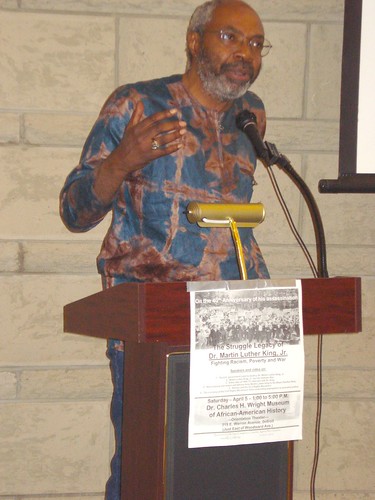
Abayomi Azikiwe, editor of the Pan-African News Wire, speaking at the Dr. Charles H. Wright Museum of African American History on April 5, 2008. The event commemorated the 40th anniversary of the assassination of Dr. Martin Luther King, Jr., a photo by Pan-African News Wire File Photos on Flickr.
BEN TALEB: Aid to Africa relies on Western interests, not human rights
Baligh Ben Taleb | Posted: Monday, February 4, 2013 1:00 am
Daily Nebraskan
With neocolonial projects in Afghanistan, Iraq and the new “scramble for Africa,” it seems colonial appetite hasn’t been entirely eradicated with the collapse of European empires. Mali, in this regard, is not an exception, but another case of post-colonial experience. Before getting there, historical context is essential.
In fact, the lights of colonialism have not tersely turned off with the existence of a “collaborator system” in place–colonial agents, like a puppet operating on behalf of their colonial power. But, if that string-puppet is endangered by popular revolt or local resistance it drives the colonial power nuts. It may cost billions of dollars and thousands of lives for the sake of maintaining that agency in place.
Take for example the former French foreign minister, Michèle Alliot-Marie, who initially offered French help to quell the uprising in Tunisia.
When colonial powers do intervene, think of the narrative that is often wrapped within a ‘benevolent’ attitude of liberalism and humanism. You can think of Libya as another case in point, where thousands of people benignly thought of the military intervention as catalyzed by humanitarian cause. Yet the recent declarations of former Italian Prime Minister and media tycoon Silvio Berlusconi demystified that normative sentiment when he admitted that “NATO’s intervention in Libya was orchestrated by then French President Nicolas Sarkozy who wanted to get a share of Libya’s natural gas and oil.”
Iraq offers another case where many people swallowed the humanitarian hemlock of the Bush administration while the daily events made human tragedies a diurnal experience, to say the least.
These examples and many others render the idea of full independence a sham.
Any military action brings in a political disaster more than it solves any putative crisis.
So, it would be farcical to think of the end of European colonial rule in Africa as a break from external influence and a springboard toward sovereignty.
During the last few weeks, the western African state of Mali has been enduring another colonial experience. To set the stage, the story has been wrapped within the old cliché of humanitarianism — protecting Malian people from regional threats, including local “Touaregs.” You may not be the only one who shrugs your shoulders to this narrative because numerous observers of colonial rhetoric are sick of listening to the same colonial jargons.
France and its Western allies claim the overarching purpose behind the military intervention was to allegedly halt the advance of the rebels, or members of Touaregs, who control the northern parts of the West African nation and protect the Malian government and its people. But it’s really to do with uranium and Western corporations in West Africa.
Abayomi Azikiwe, editor of the Pan-African News Wire, asserted that “the French are there to serve the interests of not only their own government, but also in an attempt to prop up an unstable military regime that had taken power last year in Mali.”
By the same token, member of the Belgian Chamber of Representatives Laurent Louis stood up in parliament and exposed what the war is all about.
“Today in the name of democracy and the fight against terrorism, our states grant themselves the right to violate the sovereignty of independent countries and to overthrow legitimate leaders,” he said.
Mali can’t be an exception in front of imperial projects.
They say truth is the first casualty of war.
Indeed, a satisfactory interpretation of colonial history in the region holds the key to understanding such neocolonial reality.
The equation has exponentially turned enigmatic, particularly with the hostage operations in Algeria, as it deteriorates the stability of the entire region. But this is not a novelty per se, since Africa has a history as a playground for imperial dominance.
China is now Mali’s largest export trading partner and no doubt, to counter its growing economic presence in Africa, the U.S., under its Africa Command, or AFRICOM, is politically and militarily invested in the region as well. The “neo-scramble for Africa” is about securing geopolitical interests and keeping the upper hand on the areas of vast natural resources.
This is not a Marxist-Leninist approach on historical analysis. But wherever there is a colonial act, the first question should be, “why?”
Why a swift military intervention in Mali in this particular time while more than 60,000 people were massacred in Syria? Neither France nor any “benevolent” power intervened to end that bloody quagmire.
Has the Syrian blood become cheaper than the Malian uranium?
In some eyes, yes!
The irony is that these powers have been identifying the same group deemed “extremist” through a zero-sum game in which the collaboration of some signifies the demonization of others.
There are always unattended consequences for military action, but the question now is how long will Africa be under the Western “scramble”?
Baligh Ben Taleb is a former Fulbright scholar from Tunisia and a PhD student in history, reach him at opinion@dailynebraskan.com
No comments:
Post a Comment